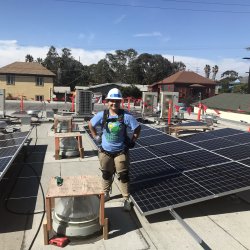Emily Corrow is the Multifamily and Commercial team’s new Project Coordinator at GRID Alternatives, after completing her 11-month fellowship as a SolarCorps intern. She joins our HQ team already familiar with the Solar on Multifamily Affordable Housing (SOMAH) Program, which provides financial incentives for installing photovoltaic (PV) energy systems on multifamily affordable housing. Her previous experience and knowledge base will be a huge asset to GRID, and we are lucky to have her join our team. We caught up with Emily and she answered a few questions about her new position.
What is your new role and location?
I will be working in project development (i.e. producing project proposals, gathering usage data, and managing incentive applications) while based in my hometown, San Diego!
What is something you are proud of working on during your SolarCorps Fellowship?
As a Project Management Fellow on San Diego’s Multifamily Team, I’ve had the chance to work on several SOMAH-funded projects and I’m really proud of the role I played in getting the incentive applications over the finish line. In the process, I learned a lot about the SOMAH program and I take pride in being able to speak confidently on the subject.
Why did you decide to move on with a full time staff position at GRID post-fellowship?
I’m a big fan of GRID Alternatives, just like I was when I applied to be a SolarCorps Fellow, so of course I said yes when they asked me to stay! Not only do I get to work at a people-first renewable energy organization, I also feel really valued as an employee and a person when I come into work, so it was an easy decision.

Why is renewable energy important for multifamily/commercial buildings?
Multifamily residential solar extends the benefits of clean, local power to renters and people living in multifamily housing, groups that disproportionately include low-income people and people of color. Generations of wealth destruction and housing discrimination mean that traditional single-family rooftop solar will not always meet these families’ needs, and for that reason they are often overlooked by the solar industry. GRID Alternatives is one of the only organizations active in the low-income multifamily solar space, and that was my number one reason for applying to my current position here. I've since had the privilege of working alongside San Diego's Commercial Project Developer, Stephen Hatcher, and administering projects that not only serve low-income tenants but also local nonprofits and tribal communities. Those experiences as a SolarCorps Fellow have helped me realize that our commercial solar work has the power to align an organization's energy consumption with their core values, as well as produce savings that can be used in service of their mission. For all those reasons, I am a passionate advocate of multifamily and commercial solar, on and off the clock.
What are you looking forward to working on with the Multifamily/Commercial team?
Learning everything I can! There is so much about multifamily/commercial project development that I have yet to learn - let alone master! - so I’m very excited to develop those skills as a member of the HQ Multifamily Team.
What are some ways you try to maintain a work/life balance?
I invest time in my hobbies, like reading and playing D&D with my college friends, and I try to get out of the house on the weekends since I spend all week working from home.
What does a sustainable future look like to you?
A future, powered by renewables, in which everyone has access to clean air and water, affordable housing, safe and fulfilling jobs that pay living wages, fair and democratic representation, and every other resource one might need to live a healthy and fulfilling life (e.g. healthcare, education, etc.).

